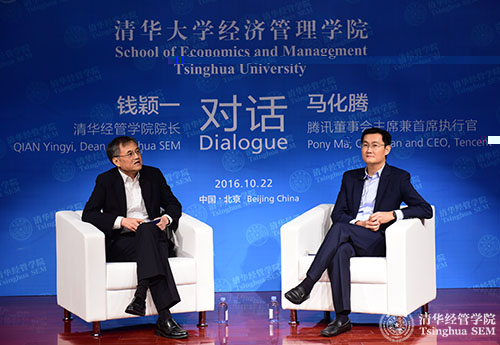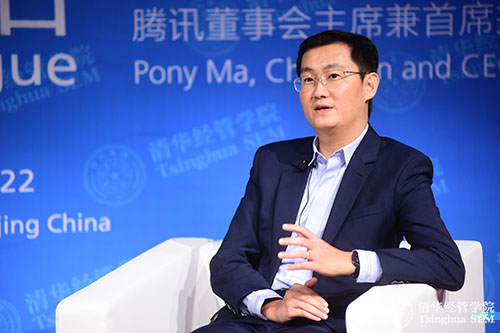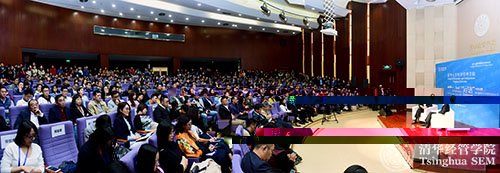On October 22, 2016, as part of the Advisory Board meeting of Tsinghua University School of Economics and Management (Tsinghua SEM), the 2016 Tsinghua Management Global Forum was held in the auditorium of Weilun Building. Pony Ma, Core Founder, Chairman of the Board and CEO, Tencent had a one-hour dialogue with Professor QIAN Yingyi, Dean of Tsinghua SEM. Dean QIAN and Mr. Ma touched on a wide variety of topics, from Mr. Ma’s educational and professional path to analysis of the emerging global innovation landscape.
An early sci-fi enthusiast, Mr. Ma shared that as he entered college, he had a strong interest in space and physics. In 1989, however, his most realistic career prospect would have been teaching physics, which had less appeal to him than the field of study itself. In a pragmatic decision, Mr. Ma instead chose to major in computer science. Still, his passion never died out, and when he visited the U.S., he purchased numerous aerospace books. In his view, fields like aerospace and astronomy emphasize the enormity of the universe, serving as a reminder of how contrastingly small humans and their individual difficulties are.

Tsinghua SEM Dean QIAN Yingyi in dialogue with Pony Ma, Core Founder, Chairman of the Board and CEO, Tencent
To the intrigue of the audience, Mr. Ma suggested that he would likely not have been able to enter Tsinghua University for undergraduate study, noting that his academic ranking was around 10th of approximately 30 in his class. Mr. Ma noted that he also didn’t have any great interest in formal student leadership during his college days. Even in his professional career, despite his immense success and position, he says that this tendency has in some ways persisted, making him inclined to leave overt administrative management to “one who looks like a boss.” In reflecting on his own style of leadership, Mr. Ma described a subtler approach of exercising influence - "first, listen; then navigate.”
Given his diversity of interests, it is perhaps no surprise that Mr. Ma advocates for the benefits of developing a cross-disciplinary focus. In the case of Tencent, he and his co-founders were able to combine their skill sets in an intersecting cross-industry emphasis on computers and telecommunications. In the early stages, however, they weren’t fixated on the idea of creating a global tech behemoth. Instead, he insists, they were mostly thinking about making a product of excellence.

Pony Ma, Core Founder, Chairman of the Board and CEO, Tencent
Mr. Ma also offered an inside glimpse into the history of the WeiXin name. As the platform was being created, Tencent had three separate teams working on development. Two of the teams happened to use the name “WeiXin” for the product they were developing, whereas the third team used “QXin.” According to Mr. Ma, the QXin team didn’t develop as good a product as the other two teams, and thus the WeiXin name won out.
At Dean QIAN’s prompting, Mr. Ma shared some of his thoughts on the changing innovation and entrepreneurship environment in China and around the world. In the wake of two major startup booms in recent years, Mr. Ma would argue that creating a startup is in some respects easier now than several years ago. For one thing, there is better access to both funding and talent. However, competition is also increasingly steep. Although Mr. Ma allowed that the U.S. still has the strongest innovation environment overall, he also pointed out that in China, if an entrepreneur has an idea and starts to execute on it, several dozen others may be doing it within two weeks. Thus, within even that two-week window, the entrepreneur often has to add features that make the product (or service) distinct and more difficult to replicate.
It is perhaps as a result of that intensity of competition, among other factors, that China’s global presence continues to climb. Of the top ten Internet companies in the world, six are located in the U.S.; however, the other four are all Chinese companies. Mr. Ma also noted the larger regional trends in development of platforms like WeChat. Most notably, Korea and Japan have heavily adopted Line. In contrast, he suggested that Europe was somewhat lagging behind in this area by virtue of the conspicuous absence of truly comparable integrated platforms.
Furthermore, Mr. Ma contended that WeChat and other Chinese platforms and tech players have begun to impact American innovation – for example, the development of third-party food delivery apps on Facebook, not unlike Ele.me and similar prevalent third-party delivery services in China. WeChat mobile payment has become so commonplace (much more so than mobile payment in the U.S.) that even local street vendors selling fruit on the corner have begun to accept - if not prefer - it. Regarding innovation, there are some respects, in Mr. Ma’s view, in which Silicon Valley is now copying developments in China.

2016 Tsinghua Management Global Forum
Still, he curtailed his enthusiasm by noting that although China has great app innovation, it is lacking in what he considers basic science areas like artificial intelligence (“AI”) and robotics. Mr. Ma acknowledged that, in retrospect, Tencent had exhibited its own shortcomings in its development efforts. For example, he cited the “mistake” of Tencent Research Academy (“TRA”) in focusing heavily on app development. In Mr. Ma’s hindsight opinion, instead of creating needless competition with in-house business units, Tencent should instead have focused TRA resources on scientific endeavors along the lines of AI. Tencent has since changed course, abandoning the prior focus of TRA and now developing a dedicated AI lab while pursuing related collaboration with Tsinghua University.
Naturally, Tencent isn’t the only one needing to vigorously guard its focus. As a cautionary note, Mr. Ma said he gets a high volume of emails with self-proclaimed “great business ideas,” but the authors often can’t expand on those ideas. In Mr. Ma’s assessment, they often are not thinking small (narrowly) enough to focus on a specific pain/problem. Hence, one takeaway for budding entrepreneurs: don’t lose sight of the trees in an attempt to address the forest. Take the effort to evaluate individual pain points rather than muddling them together into a “solution” that tries to tackle too many problems without actually offering an adequate fix for any.
Turning to the future, what will be the Next Big Thing? Dean QIAN asked Mr. Ma for his insight, but he declined to give any concrete speculation, suggesting that we really don’t know yet. However, Mr. Ma did point out that with each new revolution, the devices defining the moment tend to change (e.g., PC to mobile), perhaps providing a slight hint as to where to expect shifts in coming cycles of mass innovation.

Group photo
In closing, Dean QIAN pointed out that Mr. Ma would be marking his 45th birthday in a week. Mr. Ma deflected the notion of pausing to celebrate his young life’s remarkable accomplishments, saying that he didn’t think it was “time to write his personal biography” just yet. “I think I’m only halfway through,” he quipped, “but of course I’m very lucky.” (by Tim Hesler, GMBA Class of 2017, Tsinghua SEM)
 Latest News
Latest News